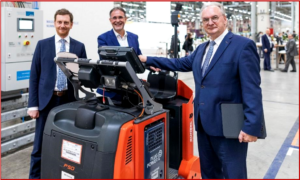
Plant Leipzig’s fourth hydrogen filling station (left to right): Michael Kretschmer, Minister President of Saxony, Hans-Peter Kemser, Director of BMW Group Plant Leipzig, and Dr. Reiner Haseloff, Minister President of Sachsen-Anhalt.
BMW Group said today that it has clear goals for effective climate protection and sustainable mobility up to the year 2030 – and its products and production are affected.
“Our solution to the challenges of environmental policy is technological innovation. Technology is where the key to the future lies – and it’s our constructive response for climate protection,” said Hans-Peter Kemser, Director of BMW Group Plant Leipzig. Leipzig aims not only to be carbon-neutral but also to operate carbon-free production. “Our vision is to fully de-carbonize production by replacing fossil fuels with future fuels in the shape of green hydrogen,” he added.
The Central German Hydrogen Summit took place at BMW Group Plant Leipzig today. In attendance were Michael Kretschmer, Minister President of the Free State of Saxony, Dr. Reiner Haseloff, Minister President of the state of Sachsen-Anhalt, Henry Graichen, County Commissioner of the Leipzig District, Kai Emanuel, County Commissioner of Nordsachsen, Burkhard Jung, Lord Mayor of Leipzig, and Egbert Geier, Mayor of Halle, along with guests from business, politics, administration and academia taking part in discussions at the plant.
The event was streamed live, with speakers exploring application and investment plans as well as the establishment by 2030 of a full-coverage hydrogen infrastructure for the Halle and Leipzig region.
Three principal challenges of using green hydrogen were discussed:
- How to ensure sufficient supplies for the plant?
- What technologies exist or need developing to enable the use of hydrogen?
- How to remain profitable despite the current high cost of green hydrogen?
Hydrogen is being used in logistics to power tractors and forklifts carrying required parts to the assembly lines in Leipzig. The first such vehicles went into service back in 2013. Plant Leipzig now operates 81in total, with 37 more to be added shortly. Then, it’s claimed, Plant Leipzig will have the largest hydrogen-powered logistics fleet in Germany. Like conventionally powered vehicles, the hydrogen fleet has the great advantage of being very quick to refuel – and the filling stations take up little space.
The Hydrogen Summit also provided the backdrop for Leipzig to inaugurate its fourth on-site hydrogen filling station. The first went on stream in 2013 in the BMW i bodyshop and was the only indoor H2 refueling station in Germany at the time. Two more followed in 2018, and a fourth is now also set to supply the steadily rising number of hydrogen vehicles. About 50 kg of hydrogen are put into their tanks every day – all of it certified green since day one.


BMW Group – Hydrogen is Key Technology for Future
Plant Leipzig’s fourth hydrogen filling station (left to right): Michael Kretschmer, Minister President of Saxony, Hans-Peter Kemser, Director of BMW Group Plant Leipzig, and Dr. Reiner Haseloff, Minister President of Sachsen-Anhalt.
BMW Group said today that it has clear goals for effective climate protection and sustainable mobility up to the year 2030 – and its products and production are affected.
“Our solution to the challenges of environmental policy is technological innovation. Technology is where the key to the future lies – and it’s our constructive response for climate protection,” said Hans-Peter Kemser, Director of BMW Group Plant Leipzig. Leipzig aims not only to be carbon-neutral but also to operate carbon-free production. “Our vision is to fully de-carbonize production by replacing fossil fuels with future fuels in the shape of green hydrogen,” he added.
The Central German Hydrogen Summit took place at BMW Group Plant Leipzig today. In attendance were Michael Kretschmer, Minister President of the Free State of Saxony, Dr. Reiner Haseloff, Minister President of the state of Sachsen-Anhalt, Henry Graichen, County Commissioner of the Leipzig District, Kai Emanuel, County Commissioner of Nordsachsen, Burkhard Jung, Lord Mayor of Leipzig, and Egbert Geier, Mayor of Halle, along with guests from business, politics, administration and academia taking part in discussions at the plant.
The event was streamed live, with speakers exploring application and investment plans as well as the establishment by 2030 of a full-coverage hydrogen infrastructure for the Halle and Leipzig region.
Three principal challenges of using green hydrogen were discussed:
Hydrogen is being used in logistics to power tractors and forklifts carrying required parts to the assembly lines in Leipzig. The first such vehicles went into service back in 2013. Plant Leipzig now operates 81in total, with 37 more to be added shortly. Then, it’s claimed, Plant Leipzig will have the largest hydrogen-powered logistics fleet in Germany. Like conventionally powered vehicles, the hydrogen fleet has the great advantage of being very quick to refuel – and the filling stations take up little space.
The Hydrogen Summit also provided the backdrop for Leipzig to inaugurate its fourth on-site hydrogen filling station. The first went on stream in 2013 in the BMW i bodyshop and was the only indoor H2 refueling station in Germany at the time. Two more followed in 2018, and a fourth is now also set to supply the steadily rising number of hydrogen vehicles. About 50 kg of hydrogen are put into their tanks every day – all of it certified green since day one.